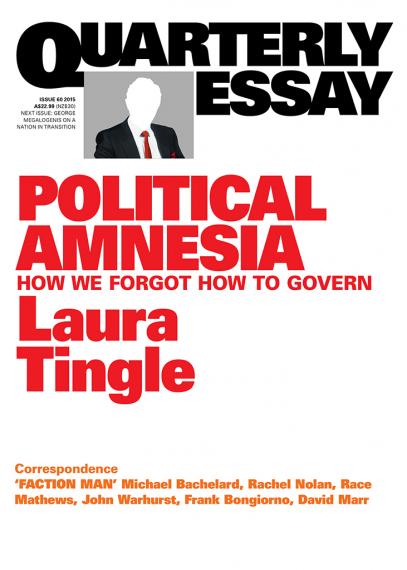A few thoughts provoked by reading Lara Tingle’s ‘Political Amnesia: How We Forgot How To Govern’ In ‘Quarterly Essay 60.’
It is one of the few ‘Quarterly Essays’ to have an argument. What is it then?

The premise is that corporate memory is a valuable asset in complex organisations to operate in a large and varied environment, and ever changing environment. Government is one such organisation that works better if corporate memory is present. Those seem to be the most relevant assumptions.
The argument then is that corporate memory has been systemically, if inadvertedly, reduced in the Australian Commonwealth Government since the 1980s. The signal indication of this was the shift from tenure to higher pay for the elite of the public service. That was the end of the permanent department head, and by implication the end of any permanence down the ladder in the public service.
Tingle gives several reasons, a compound of these elements:
1. contracting out public services so that the remaining public servants do not have first hand experience at delivery and so do not know the problems and opportunities in the field. It is certainly true that I have spoken to public servants who write contracts for others to bid on to deliver services, and these contract-writers have no firsthand experience in the field. They say they rely on the contractors, because the competitive market will keep them honest. (Did someone say that about the Australian Wheat Board?)
2. the contractors come and go and even those that recur have a staff turnover that limits their memory as well. One of the goals of contracting out is to cut cost, the chief one being something that is never said: superannuation. The unfunded liability of the Commonwealth government for public servants’ superannuation is astronomical and seemed to grow exponentially. Those commitments were reduced for the future, but the historical legacy is still enormous. To avoid a colossal increase the key is to have fewer public servants.
3. public servants find career is best served by avoiding service delivery departments (an old one). Those public servants who remain discovered that expertise (developed in part by trial and error) is no longer valued and so it no longer valuable in career advancement. Service delivery is hard, exhausting, and can go wrong. Drafting policy papers is none of that.
4. career is made by moving from one department to another rather than concentrating on one speciality. Here we have that old chestnut that management/policy/administration is generic, neither carrying nor requiring specific knowledge. Indeed such knowledge is a hinderance.
5. at a second level appointed ministerial staff have replaced public servants in policy and program development and they come with no corporate memory and move on without leaving any behind.
6. ministers move from one portfolio to another, especially when moving from opposition to government. They do not know what they do not know. That is so simple and obvious and yet hard to explain to a third party, let along to a principal.
7. new ministers distrust public servants in the increasing polarised atmosphere of Canberra. I expect this one is crucial. The air of conspiracy and menace in Canberra seems to increase every year. Partly the media appetite for dirt subjects every move to hours of video and talking head scrutiny. Many in opposition set themselves against both the Government of the day and all who assist it, namely, the public servants. The flexibility in employment introduced by Labor when permanent heads of departments were abolished, now makes it easy to deal with those enemies once in office.
8. the repeated purges of the public service have left one memory among public servants, that is to keep heads down. The endless, repeated cuts in the public service have not only lowered the morale of the public service, though no one will admit it, it has also discouraged people from supposing there is a lifetime career there. It is not just movement between departments but also the movement out of the public service that diminishes the talent pool.
9. the blind faith that the market will generate a response, e.g., a sufficient number of skilled and qualified tradesmen to install insulation in the political time line. This is an ancillary point.
Overall the essay sounds curmudgeonly and I like that but…. Remembering that ‘we tried it before and it did not work,’ well, yes, and I have said that myself more than once in my little patch, but it is also true that times change and perhaps the time is now right. I saw ideas fail, and then arise again and work. It does happen.
To this reader the stronger ground for the argument is that memory of how to work the process, negotiate with the cross bench, involve parliamentary committees, respect parliamentary draftsman…. When this memory is lost mistakes will be made and repeated, forgotten and repeated again.
My caveat to the argument is this: The waves of retrenchments, downsizing, has not just shed people, it has also shed expertise (as distinct) from memory which has not been replaced like parliamentary draftsmen.
The short cycle of elections has always been with us, and the media has always been rapacious.
Tingle also makes a good point about the transition from opposition to government that I would give more emphasis. A leader of opposition works very closely with a very small staff due to funding, office space, convenience, and so on. There is something of a bunker mentality in most opposition leader’s offices: us versus them. The Opposition leader alone challenges the sitting government. The media certainly play it that way. Add to that a long tenure as opposition leader and these tendencies deepen.
In a polarised atmosphere my enemy’s friend is my enemy. Public servants who work hard and closely with the government of the day can become, to an opposition leader, such enemies-by-association. Hence the now recurrent purges of public servants when government change.
The silent assumption is that there are plenty of hard working, bright, and talented people to take over. There are always plenty of people who think they fit that description. Or is the assumption that talent does not matter. By ‘talent’ I wrap together memory and expertise to keep the terminology simple.
For shadow ministers in opposition who have never been a minister, parliament might be something like theatre. Huh?
They see many plays, each and everyday, but they have never been behind the scenery and have never seen any of the stage machinery and stage management that puts on the show, have not talked to the carpenters who built the scenery or electricians who handle the lights. Theatre critics concentrate on the result without a thought to the production. Fine for them as critics who do not aspire to be producers. But shadow ministers who criticise ministers aspire to be ministers.
There is a learning curve in the transition from opposition front bench to minister that is seldom recognised by new ministers who carry attitudes, habits, expectations, ambitions formed in opposition to government. The gap between opposition and government is also abridged by journalists who refer to shadow ministers as ministers. Grrr, ABC journalists do this, I am told, partly to inflate the importance of an interview in the minds of viewers and to flatter the interviewee. There are so many excuses for stupidity.
The most troublesome part of the luggage a new minister carries is the conviction that for a minister to say it is so makes is so. All it takes is will power! The details, leave those to others, and focus on the big picture!
Pile those clichés high!
The devil hides in the detail. Those looking up at the big picture often step in potholes.
There is no right way to do the job, but mixed scanning, near and far, is the best way to learn. But of course one has to want to learn or to know that there is something to learn. Some in opposition do study the process, monitor committees, read interim reports, talk to public servants, make constructive criticisms and these few are more likely to make an easier transition to minister. But often such an approach is criticised by colleagues because it is not aggressive enough, not machismo enough. Who needs details when bluster is the coin of the realm.
Having said all that, I am not sure returning to the era of the Seven Dwarfs, i.e., permanent heads of departments would offer a net gain. Or would it be to trade one set of problems for another.
 Lara Tingle
Lara Tingle
Still any lengthy essay on contemporary politics that starts with rumination about Tacitus is must reading for nerds.
Skip to content
